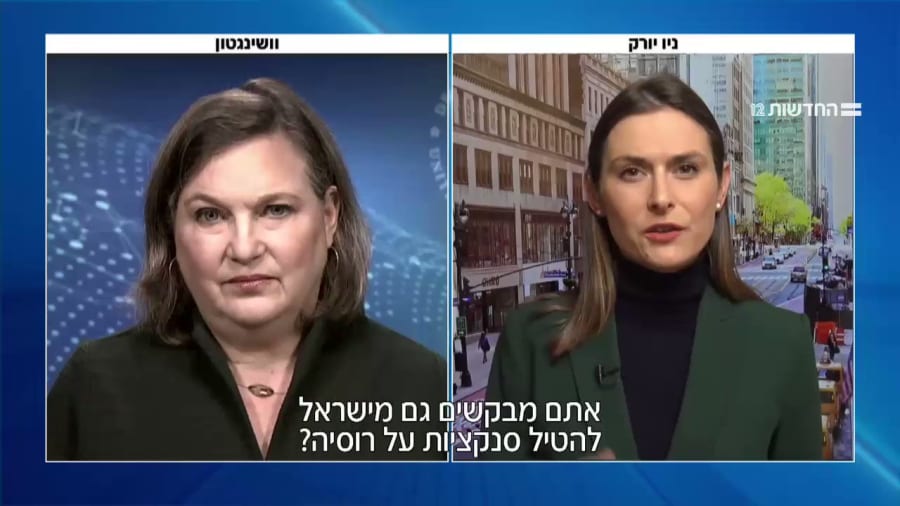US pushing Israel to join economic sanctions against Russia despite security concerns at home
Victoria Nuland warns that Israel doesn't "want to become the last haven for dirty money"

The Biden administration warned Israel that it needs to join international efforts along with “every democracy” in the world to sanction Russia before it becomes a “haven for dirty money.”
U.S. Undersecretary of State for Political Affairs Victoria Nuland, in an exclusive interview with Israel’s Channel 12, said that Jerusalem should get on board with financial sanctions against Moscow.
“What we are asking, among things, is for every democracy around to join us in the financial and export control sanctions that we have put on (Russian President Vladimir) Putin,” she said during an interview with correspondent Yuna Leibzon on Friday. “In that context we are asking as many countries as we can to join us. We are asking that of Israel as well. Among other things, you [Israel] don’t want to become the last haven for dirty money that is fueling Putin's wars.”
“We have to squeeze the regime. We have to deny it the income that it needs,” Nuland said regarding sanctioning Russian oligarchs.
When asked whether America also expects Israel to provide military equipment, Nuland said “that’s a sovereign decision for Israel to make.”
“Many democracies around the world are stepping outside their comfort zone to supply security and military support to Ukraine, but what’s most important from our point of view right now is to join the financial sanctions,” she added.
Israel has watched its diplomatic steps carefully during the Russia-Ukraine war as it has relations with both nations, albeit tenuous. The Russian military operates in Syria and maintains a status quo with Israel, allowing the Israeli air force to target Iranian operations there.
Somehow, Israeli Prime Minister Naftali Bennett has found himself at the center of potential peace talks with a request from Ukrainian President Volodymyr Zelenskyy to host Ukraine and Russia in Jerusalem. Bennett has spoken with both Putin and Zelenskyy several times since the Russian invasion – including an hour-long conversation yesterday with Zelenskyy. He also met with Putin in Moscow last Saturday.
Nuland welcomed these diplomatic efforts, but said that, “Unfortunately, to date, Putin’s demands are maximalist. He’s essentially asking for the capitulation of Ukraine.”
“We welcome all efforts of diplomacy and the fact that Israel has had in the past a strong relationship with the Kremlin – we’re grateful that the prime minister was willing to use that and continues to be willing to use that to try to get this war to end. Unfortunately, President Putin doesn’t appear to be listening,” she said.
Meanwhile, Ukraine’s Ambassador to Israel Yevgen Korniychuk also expressed his own frustration, saying he expects Israel “to join the sanctions of the alliance including, but not only, those of the United States and the European Union.”
“We do believe that the current war is a war of values,” Korniychuk said. “We hope that morally the decision will be taken by every single big business in Israel to stop collaboration with Russia.”
He was nonplussed by Israel’s concern of Russia's presence in Syria and said Israel “is afraid.” He compared the security concerns of the Jewish state to those of the Baltic states “that directly neighbor Russia, which has thousands of troops on those borders” and Balkan states that “do not care."
“They are sending military assistance to Ukraine. They are not afraid,” he said.
Korniychuk also said that Israel should raise the limit of refugees from 25,000.
The ambassador noted that President Zelenskyy feels a “special emotion for Israel because his mother is Jewish,” but added that that the feeling should be mutual.

Nicole Jansezian was the news editor and senior correspondent for ALL ISRAEL NEWS.














